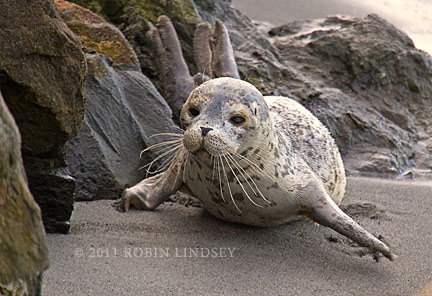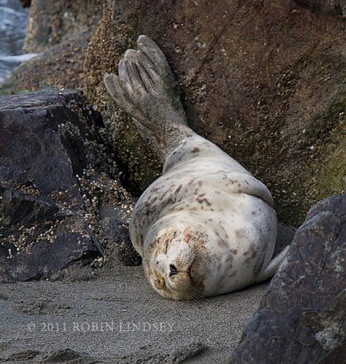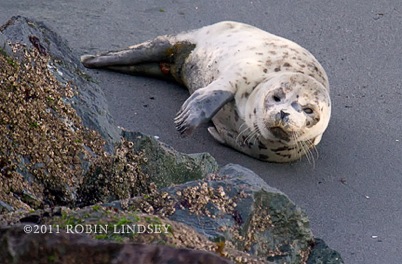Frosty
Frosty's death a harsh reality for weaned pups
Dec/30/11 07:47 AM

Around 9pm Saturday night, the hotline received a call of a pup “sleeping peacefully” on the beach. Our responder instead found a dead pup. There, in the darkness, we examined both the pup and the area surrounding him. There were no human footprints or animal tracks to indicate foul play or the presence of a predator nor any obvious cause of death. By the beam of the flashlight, our investigator was saddened by the realization that it was most likely Frosty, who had distinctive markings under his eyes (photo comparisons late that night confirmed the identity). We could see his haulout tracks leading a distance up from the water’s edge to the rocks below the sea wall and his return tracks halfway back to the Sound where he died.
Frosty’s body was delivered to the WDFW Marine Mammal Investigations Unit early Christmas morning for necropsy. Many thanks to volunteer Theresa for making that long, sad drive on a holiday. The subsequent necropsy revealed that Frosty had been foraging very successfully, with a belly of fish bones and parts, and was in fair body condition. However, his lungs and trachea were filled with lungworms and he had pneumonia complicated by a bacterial infection. The biologist was amazed that he had been able to continue to dive and catch fish with such limited lung capacity.
So, why is it that weaned pups are so much more at risk for parasite loads and infection than adult seals? As Dyanna Lambourn, WDFW marine mammal biologist explains, a nursing pup gains temporary or “passive” immunity from mom’s milk which contains a high density of white blood cells. While nursing, if that pup is exposed to a parasite or virus, his body will begin to develop its own antibodies - all the while being stimulated and reinforced by mom’s immunity. Once weaned, however, the pup’s immune system no longer has that support and quickly becomes suppressed. If the now vulnerable pup is exposed to a new worm or virus, he may not be able to build antibodies quickly enough to fight it off or the accompanying complications. As Dyanna says, it is similar to sending your child off to kindergarten, where suddenly she is exposed to a myriad of new “bugs.” But pups weaned at only 4-6 weeks don’t have mom’s milk and protection to nurse them back to health.
Weaned pups face extreme challenges. Learning to catch fish can be a daunting task. As they struggle to learn to forage on their own and become thinner, losing that layer of blubber that provides warmth and energy, opportunistic parasites and viruses can take hold. Contaminants in our polluted waters drastically compound the risk to weaned pups. Storm runoff contaminants, such as pcbs and flame retardants, enter the food chain and further weaken a pup’s already compromised immune system.
As we have stated many times in our public outreach, a seal pup has only a 50% chance of survival the first year. This is why it is so imperative that people allow them the best chance possible - by giving them space on shore to rest and warm up. This simple act can truly be the difference between life and death. The total number of dead pups in West Seattle since August has now reached 16 - while only 5 of those belonged to our database of the 50 pups we’ve watched over this season (Tiny, Bianca, Qayak, Aquarius and now, Frosty). This white little pup Frosty brought a tremendous amount of joy and awareness to all who watched over him this Christmas season.
Frosty the seal pup needs rest, not tuna fish
Dec/23/11 06:42 PM

The person who tried to feed Frosty obviously had good intentions, but it was very misguided. Instead of helping Frosty, it only put him at risk. And that person was at risk as well. Pups can inflict a very serious wound and can transmit disease. Additionally, the food might have attracted another animal, such as a raccoon or coyote, which could have led to injury of either or both animals. We want to remind everyone that it is ILLEGAL to disturb in any way a resting marine mammal. Attempting to touch, move or feed a seal is a violation of Federal law - the Marine Mammal Protection Act. The best thing anyone can do for seal pups is to let them get the rest which is critical to their survival and please call our hotline @ 905-7325 (SEAL).
Milestone pup #50 visits West Seattle
Dec/22/11 06:43 PM








